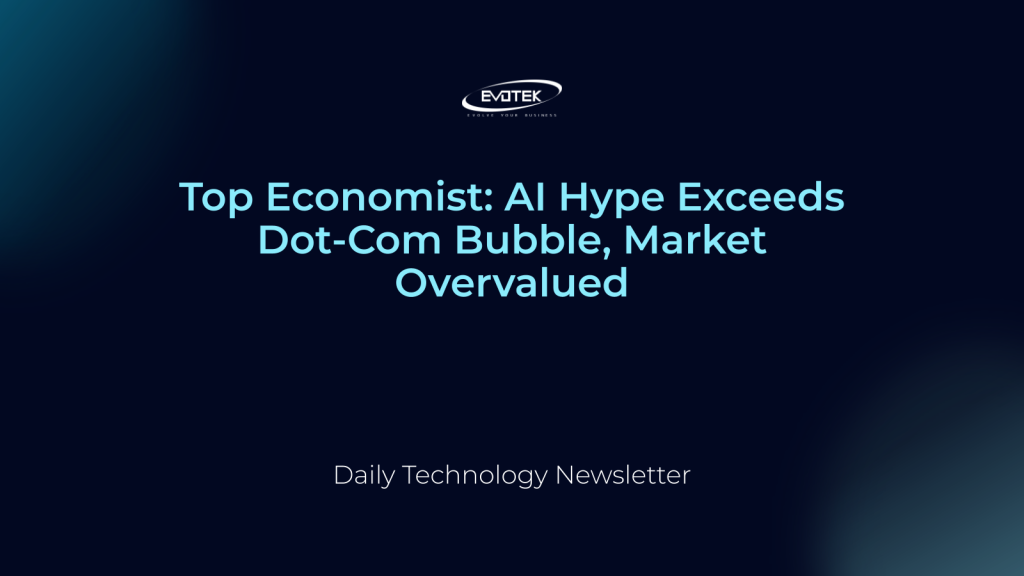As tech giants funnel monumental investments into artificial intelligence, a leading economist issues a stark warning: the current AI boom may be even more overhyped than the infamous dot-com bubble of the late 1990s. This caution comes amid sky-high price-to-earnings (P/E) ratios, suggesting investors are drastically overestimating the immediate value and future returns of AI-driven ventures.
Echoes of the Dot-Com Era?
Torsten Slok, chief economist at Apollo Global Management, recently asserted that the stock market is currently valuing a select group of tech powerhouses—including industry titans like Nvidia and Microsoft—at levels that surpass the exuberance seen for early internet companies just before the dot-com crash in 2000. This historical parallel implies that a similar market correction, with “AI” replacing “dot-com” as the central buzzword, could be on the horizon.
The late 1990s saw a surge of venture capital flowing into countless companies hoping to capitalize on the internet’s burgeoning popularity. The stock market subsequently inflated the sector’s value far beyond what tangible revenues could justify. When these lofty expectations went unmet, the bubble burst, leading to the collapse of numerous startups and wiping out trillions in market capitalization.
Unprecedented Valuation Metrics
Slok argues that today’s market expectations are even more detached from reality. He points to 12-month forward price-to-earnings ratios, which have now climbed beyond the peak recorded during the dot-com bubble. A company’s P/E ratio is a critical metric, measuring the relationship between its share price and the profit it generates per share. A high P/E typically signals strong investor optimism about future earnings potential.
Analysis of S&P 500 ratios, observed at five-year intervals from 1990 to 2025, vividly illustrates the dramatic spike in 2000 during the dot-com frenzy. Intriguingly, similar sharp increases in 2020 and 2025 suggest that the current AI-fueled valuation bubble might be even more pronounced and potentially unsustainable. What amplifies this concern is the significant disparity in P/E ratios: the top 10 companies within each spike show ratios far exceeding the rest of the index.
This stark divergence indicates that investments in these dominant firms—predominantly tech giants heavily invested in AI—have become disconnected from the actual profits their nascent AI technologies are currently generating. Companies such as Nvidia, Microsoft, Apple, Amazon, Meta, Alphabet (Google), and Tesla are responsible for the lion’s share of the S&P 500’s recent growth, consolidating significant market value.
Industry Leaders Share Concerns
Slok’s warning resonates with concerns articulated by other prominent figures in the technology sector regarding the inherent risks facing AI companies. Robin Li, CEO of Chinese internet giant Baidu, has grimly predicted that only approximately one percent of AI firms will ultimately survive if, and when, the current bubble deflates. He anticipates that such a market shake-out would eventually lead to a more stable and mature market, populated by AI applications with more realistic and sustainable business models.
High Stakes in the AI Race
Despite these growing cautionary voices, tech behemoths continue to pour immense capital into artificial intelligence as its popularity and perceived potential skyrocket. This underscores the incredibly high stakes in this rapidly evolving and fiercely competitive domain. For instance, OpenAI is actively developing an AI-powered web browser, aiming to challenge Google Chrome’s established dominance. Meta Platforms, meanwhile, is committing over $60 billion to construct new AI data centers, demonstrating its massive bet on the technology.
Even as these investments escalate, companies are making tough strategic decisions. Microsoft recently announced 9,000 job cuts, partly to offset the colossal costs associated with its new AI infrastructure, estimated at a staggering $80 billion. Concurrently, Amazon has unveiled ambitious plans for agentic AI, signaling unequivocally that the intense race for AI leadership shows no signs of decelerating, despite the economic warnings.

 日本語
日本語 한국어
한국어 Tiếng Việt
Tiếng Việt 简体中文
简体中文